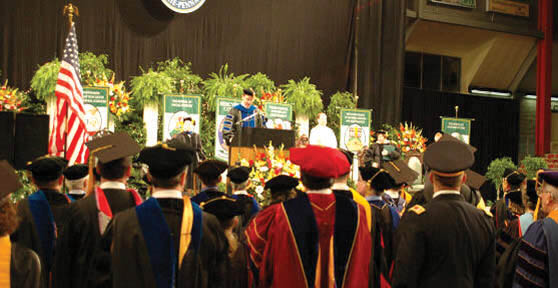University reduces number of faculty to help cut costs

The university’s administration will make decisions about faculty changes by the end of this semester.
February 10, 2016
Mercyhurst will undergo more restructuring as it plans to “right-size” its faculty and keep up with market trends, university officials announced.
The university will take a “multi-faceted approach” to reducing the number of faculty, according to David Dausey, Ph.D., provost and vice president for academic affairs.
“What’s happened organically, probably over the last five years, has been that the faculty growth has outpaced student growth,” said Dausey. “Our student numbers have dropped by nine percent. Our faculty grew by 20 percent.”
To begin adjusting this imbalance, the university will offer incentivized voluntary retirement to older faculty, he said.
“We feel it’s consistent with our Mercy Mission. We feel it’s a fair and honorable way to offer somebody recognition for their service to the organization,” Dausey said.
Another part of this strategy is not renewing year-to-year contracts for some non-tenured faculty members.
Cutting majors or programs remains a possibility, he said.
The reductions in faculty would take place in the 2016-17 academic year.
“Our primary focus is to be responsible stewards of our money,” Dausey said.
Dausey met with several Merciad editors on Friday.
The administration called a faculty forum on Thursday, Feb. 4, the second day of spring term.
“While we can understand the necessity to do this, it nevertheless is a gut-wrenching thing to have to face the reality,” said Joanne Hosey-McGurk, Ph.D., president of the Faculty Senate. “We know that students and faculty have close relationships so people are going to be very seriously affected by this. We were certainly shocked by the necessity for this.”
Administrators discovered the need to make these changes very recently, according to Hosey-McGurk. She said she was notified of the situation in early January.
“We had suspected, many of us, that things were not going in the right direction with the previous administration but we didn’t realize how serious the situation had become,” she said.
The entire faculty and staff have had a freeze on salary for three of the last four years, and there is currently a hiring freeze in place. Dausey said the university will be creative with the resources it has now until it is in a position to hire responsibly.
“It’s hard to know (how many faculty will be cut) until we present people with offers and they decide whether or not they want to accept them,” he said.
Dausey said he hopes senior faculty who choose to accept the retirement incentives stay in close contact and come back to the university and serve in a professor emeritus status.
All decisions will be made by the end of spring term, Dausey said.
Some students are concerned about their professors and departments. Sophomore Competitive Business Intelligence major Rebecca Harms said she is concerned about which professors are still going to be here next year.
“Although there are still some really great older faculty, some of the younger professors I’ve had have been some of my favorites,” Harms said.
Sophomore Mary Jaskowak comes from a small department, Mathematics.
“I understand why they might need to make cuts but just because a department is small shouldn’t make it a target,” said Jaskowak. “To let go of exceptional teachers because we can’t afford to employ them is not fair to students who won’t get to benefit from them like I have.”
Cutting majors or academic programs will be a last resort, Dausey said.
“There are often times for the reinvention of things, you know the digital humanities, media studies in general,” said Dausey. “We may take those actions to re-brand or to shift resources in such ways that it is represented of what we feel is the new thing.”
According to Hosey-McGurk, making these changes is a crucial part of keeping up with the changing financial climate and market trends of higher education.
“I think these changes, while they’re going to be hard, if we don’t do it then there won’t be a Mercyhurst to make changes in of any kind,” Hosey-McGurk said.
Dausey said the administration take the caretaking of the institution very seriously.
“It doesn’t happen by accident. The Sisters (of Mercy), through blood, sweat and tears, kept this place humming and it’s our job to do the same thing and that sometimes involves making hard decisions,” said Dausey. “Those hard decisions, as challenging as they be, are ones that are for the betterment of the institution.”
